Glycolysis end products - Study guides, Class notes & Summaries
Looking for the best study guides, study notes and summaries about Glycolysis end products? On this page you'll find 753 study documents about Glycolysis end products.
Page 2 out of 753 results
Sort by

-
Cellular Respiration (Honors Biology) Questions and Answers Already Passed
- Exam (elaborations) • 11 pages • 2024
- Available in package deal
-
- $9.99
- + learn more
Cellular Respiration (Honors Biology) Questions and Answers Already Passed What is the overall chemical equation for cellular respiration? The overall chemical equation for cellular respiration is: C6H12O6 + 6O2 → 6CO2 + 6H2O + ATP. How many ATP molecules are typically produced from one glucose molecule during cellular respiration? Typically, about 36 to 38 ATP molecules are produced from one glucose molecule during cellular respiration. What is the role of NADH and FADH2 in c...
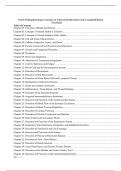 Popular
Popular
-
Test Bank Porth Pathophysiology Concepts of Altered Health States 2nd Canadian Edition
- Exam (elaborations) • 289 pages • 2023 Popular
-
- $17.99
- 5x sold
- + learn more
Test Bank Porth Pathophysiology Concepts of Altered Health States 2nd Canadian EditionTable of Contents Chapter 01: Concepts of Health and Disease .......................................................................................................... 2 Chapter 02: Concepts of Altered Health in Children ............................................................................................. 13 Chapter 03: Concepts of Altered Health in Older Adults ............................................

-
Bio 206 Exam 1 Study Guide Questions and Answers Graded A 2024
- Exam (elaborations) • 9 pages • 2024
-
- $13.49
- + learn more
Steps of Feedback Loop - Stimulus Sensor (afferent pathway) Integrating Center (efferent pathway) Effector Response isocitrate dehydrogenase - rate limiting enzyme in krebs cycle (citric acid cycle) Phosphofructokinase - rate limiting enzyme in glycolysis cytochrome oxidase - rate limiting enzyme in Electron Transport System Kinase - transfer of a phosphate Primary substrate glycolysis - glucose Isomerase - rearrangement of atoms glyceraldehyde 3-phosphate (GAP) - The ...
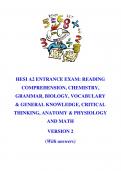
-
HESI A2 ENTRANCE EXAM: READING COMPREHENSION, CHEMISTRY, GRAMMAR, BIOLOGY, VOCABULARY & GENERAL KNOWLEDGE, CRITICAL THINKING, ANATOMY & PHYSIOLOGY AND MATH
- Exam (elaborations) • 81 pages • 2024
-
- $8.99
- 3x sold
- + learn more
HESI A2 ENTRANCE EXAM: READING COMPREHENSION, CHEMISTRY, GRAMMAR, BIOLOGY, VOCABULARY & GENERAL KNOWLEDGE, CRITICAL THINKING, ANATOMY & PHYSIOLOGY AND MATH VERSION 2 (With answers) Reading Comprehension Neurologists and biological psychologists have witnessed a sharp increase in the knowledge and understanding of particular structures of the brain over the past two decades. As technology becomes ever more advanced, scientists are able to isolate the functions of even small regions of ...
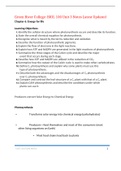
-
Green River College: BIOL 100 Unit 3 Notes Latest Updated,100% CORRECT
- Class notes • 116 pages • 2023
-
- $16.99
- 1x sold
- + learn more
Green River College: BIOL 100 Unit 3 Notes Latest Updated Chapter 6: Energy for life Learning Objectives: 1. Identify the cellular structure where photosynthesis occurs and describe its function. 2. State the overall chemical equation for photosynthesis. 3. Recognize what is meant by the terms reduction and oxidation. 4. Describe the function of photosynthetic pigments. 5. Explain the flow of electrons in the light reactions. 6. Explain how ATP and NADPH are generated in the light reac...
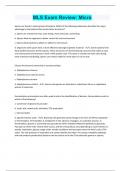
-
MLS Exam Review: Micro | Verified | 26 Pages
- Exam (elaborations) • 26 pages • 2023
- Available in package deal
-
- $15.49
- + learn more
Spores are found in select groups of bacteria. Which of the following statements describes the major advantage to the bacteria that posses these structures? a. Spores are resistant to heat, cold, drying, most chemicals, and boiling b. Spores allow an organism to better control its local environment c. Spores allow bacteria to attach or adhere to host tissues d. Organisms with spores have a more efficient exchange of genetic material - a. Some bacteria form thick-walled structures termed sp...
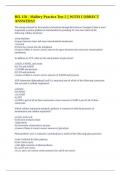
-
BIL 150 - Mallery Practice Test 2 || WITH CORRECT ANSWERS!!
- Exam (elaborations) • 13 pages • 2024
- Available in package deal
-
- $13.99
- + learn more
The energy released by the transfer of electrons through the Electron Transport Chain is used to generate a proton gradient in mitochondria by pumping H+ ions into which of the following cellular locations? a) nucleoplasm b) space between inner and outer mitochondrial membranes c) cytosol d) from the cytosol into the mitoplasm e) none of these is correct correct answers b) space between inner and outer mitochondrial membranes In addition to ATP, what are the end products of glycolysis?...
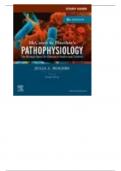
-
TEST BANK PATHOPHYSIOLOGY THE BIOLOGICAL BASIS FOR DISEASE IN ADULTS AND CHILDREN BY McCance
- Exam (elaborations) • 493 pages • 2023
- Available in package deal
-
- $6.69
- 4x sold
- + learn more
TEST BANK PATHOPHYSIOLOGY THE BIOLOGICAL BASIS FOR DISEASE IN ADULTS AND CHILDREN BY McCance Chapter 1: Cellular Biology MULTIPLE CHOICE 1. Which statement best describes the cellular function of metabolic absorption? a. Cells can produce proteins. c. Cells can take in and use nutrients. b. Cells can secrete digestive enzymes. d. Cells can synthesize fats. ANS: C In metabolic absorption, all cells take in and use nutrients and other substances from their surroundings. The remaini...

-
UTSC BIOA01 Life on Earth TERM TEST #1 60 PRACTICE QUESTIONS AND ANSWERS 2024
- Exam (elaborations) • 13 pages • 2024
-
- $12.49
- + learn more
UTSC BIOA01 Life on Earth TERM TEST #1 60 PRACTICE QUESTIONS AND ANSWERS 2024 Here are 60 Practice Questions so you can have an idea of the kind of questions that are likely to be asked on Term Test # 1. 1. Which of the following is a correct sequence for the biological classification of organisms? A. genus, species, family, order, class, phylum, kingdom B. genus, species, family, order, class, kingdom, phylum C. genus, species, order, family, class, phylum, kingdom D. species, genus, or...
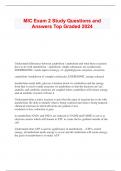
-
MIC Exam 2 Study Questions and Answers Top Graded 2024
- Exam (elaborations) • 24 pages • 2024
-
- $13.49
- + learn more
Understand differences between catabolism / anabolism and what these reactions have to do with metabolism - anabolism: simple substances are synthesized, ENDERGONIC, needs input of energy, ex: peptidoglycan, enzymes, exotoxins catabolism: breakdown of complex molecules, EXERGONIC, energy released metabolism needs both, glucose is broken down via catabolism and the energy from that is used to make enzymes via anabolism so that the bacteria can 'eat', anabolic and catabolic reactions are c...

Study stress? For sellers on Stuvia, these are actually golden times. KA-CHING! Earn from your study resources too and start uploading now. Discover all about earning on Stuvia


